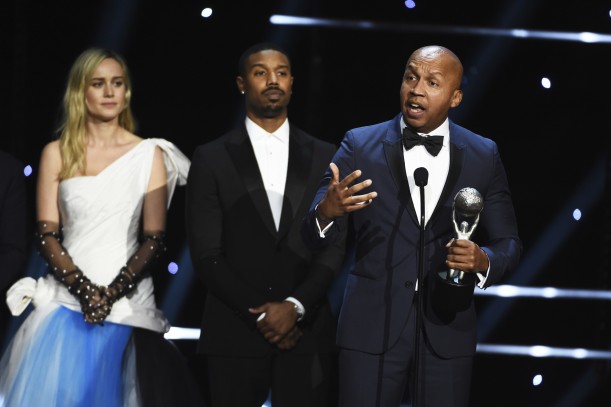Resiliency, Self Care Key to Fighting to Exonerate Innocent

Bryan Stevenson accept the award for outstanding motion picture for “Just Mercy”at the 51st NAACP Image Awards at the Pasadena Civic Auditorium on Saturday, Feb. 22, 2020, in Pasadena, Calif. Brie Larson and Michael B. Jordan stand behind Stevenson. (AP)
Between 1989 and 2019, more than 2,600 people in the United States were exonerated of crimes they did not commit.
That statistic comes from the National Registry of Exonerations, a project of the Newkirk Center for Science & Society at University of California Irvine, the University of Michigan Law School and Michigan State University College of Law.
The exoneration of the innocent was a topic of a continuing legal education session during the Nebraska State Bar Association Annual Meeting.
Using the 2019 film “Just Mercy” as a framework, “Just Mercy and Access to Justice: Illuminating Bias, Confronting Systemic Racism, and Doing the Hard Work that Needs to Be Done” offers a lively roundtable discussion about how lawyers who fight for the wrongfully convicted can, and must, develop great resilience in order to sustain themselves, and their clients, during the lengthy process of proving someone’s innocence post-conviction.
“Just Mercy” tells the true story of Bryan Stevenson, founder of the Equal Justice Initiative, as he fights to secure Walter McMillian’s release from prison in Monroeville, Alabama.
McMillian, a Black man, was arrested in 1987 for the murder of Ronda Morrison, an 18-year-old white woman.
Immediately following his arrest and despite overwhelming evidence – including multiple eyewitnesses who placed him miles from the scene at the time of the crime – McMillian was sent directly to death row, where he was held for 15 months before his trial began.
Due to the tireless efforts of Stevenson and the EJI staff, McMillian was ultimately exonerated and released in 1993. He spent more than 70 months on death row for a crime he didn’t commit, and the Morrison murder was never solved.
Moderator Chris Osborn and a panel of legal professionals and exonerees use the film to illustrate the emotional toll felt by those who take up this kind of work and how to persevere through it. The panel also discusses systemic racism and how bias, implicit or otherwise, can result in dangerous miscarriages of justice.
One of the exonerees on the panel is a Black man named Ricky Kidd, who was convicted in 1997 of a double homicide in Kansas City with which he had nothing to do.
At the time of the murders, Kidd was at the Jackson County Sheriff’s Office filling out an application for a gun permit. Nevertheless, Kidd was convicted largely based on witness misidentification and inadequate legal defense, and he faced a sentence of life in prison without the possibility of parole.
Kidd was eventually exonerated with the help of lawyers from the Midwest Innocence Project, but only after spending more than 20 years in prison.
“It was a nightmare,” Kidd said. “I just knew I had to survive. And something inside me said I had to do something different than drown.”
Kidd discussed how he had to learn on his own to remain resilient after his conviction by reading psychology books that gave him the tools he needed to keep going.
The CLE session also includes written material about understanding and reducing the impact of implicit bias when practicing law, and self-care tips and techniques for lawyers involved in this sort of emotionally-draining work.
“Just Mercy and Access to Justice” is available as part of the virtual Annual Meeting until July 2, 2022, and it counts for 2 hours of credit. The session can be accessed anytime via the NSBA OnDemand CLE portal at nsba.mycrowdwisdom.com.
For more information on the Midwest Innocence Project, including how to volunteer, visit themip.org. The organization also has a local affiliate, the Nebraska Innocence Project. Find more information, including details about upcoming events, at facebook.com/NebraskaInnocenceProject.
User login
Omaha Daily Record
The Daily Record
222 South 72nd Street, Suite 302
Omaha, Nebraska
68114
United States
Tele (402) 345-1303
Fax (402) 345-2351




